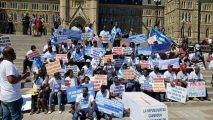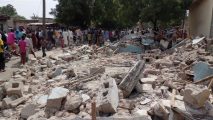2, June 2016
President Goodluck Jonathan:Recognizing the vision and record of a great leader 0
Cameroon Concord News Group was pleased to announce former Nigeria President Good Luck Jonathan as their man of the year 2015. We arrived at this conclusion after a careful and anxious consideration of a wide range of candidates. We considered the contributions of the candidates to the development and improvement of the human condition within their communities, their countries and the world at large. Our choice fell on the former Nigerian president Good Luck Jonathan due to his contributions to the enthronement of a sound democratic culture and society, democratic constitutionalism, peace, security and good governance in his country the Federal Republic of Nigeria. The vision and record of Good Luck Jonathan will greatly contribute to the development of a credible democratic culture and economic emancipation of Africa.
Former Nigerian President Good Luck Jonathan maintained the integrity and unity of Nigeria which this paper regrets, Buhari is jeopardizing with his ethnic politics that undermines the federal character of his country. The resurgence of the popular clamour for the reactivation of the sovereign state of Biafra as the recent demonstration by millions of people of Eastern Nigeria origin at home and worldwide is an obvious indicator.
While in opposition President Buhari made statements that undermined the war effort against Boko Haram. He later rallied the ethnic support of Northern Nigeria and hoodwinked the gullible Yoruba power elite to return power to the North. Now in power President Buhari’s inconsistent policy of wanting to negotiate and fighting Boko Haram is an indication that he does not intend to fight them with the same intensity that Jonathan did. Jonathan an ethnic minority Ejaw from the volatile Niger Delta of Nigeria succeeded in negotiating a peaceful abatement of the armed insurgency in the Niger Delta that disrupted oil exploitation, the main stay of the Federation’s economy and international maritime traffic. That was a major achievement that merits recognition.
Jonathan has been criticized of being lax in the fight against corruption. This criticism is exaggerated considering the fact most efforts he made in the fight against corruption were indeed sabotaged by some of the very born again torn coat politicians who energized and sponsored the then opposition APC alliance to wrestle power from Jonathan. It was on Jonathan’s watch that some of the Sani Abacha loot was repatriated and fiscal and financial discipline introduced into governance. The Ngozi Okongo Eweala led nationally and internationally acclaimed economic policies identified and closed loopholes in government fiscal and financial policies, depriving corrupt politicians and business men of the impunity with which they looted public wealth. This made powerful enemies against Jonathan within and out of his own political party the PDP. Some left to join the opposition APC alliance and have since been portrayed as the saints who will wipe corruption from the face of Nigeria. Sooner or later, the true motives underpinning the born again posturing of these political torn coats will become as obvious as day follows night to all to see. Then and only then will Nigerians discover the truth that leopards do not indeed change their spots.
Jonathan’s respect of the Federal character in critical government appointments; in particular appointments into ministries and portfolios overseeing national sovereignty insured that Nigerians of all ethnicities had roles and stakes in national decision making. The national conference organized by Jonathan provides Nigerians an opportunity to chart a new future for their country and to recommit to the idea of unity in diversity. The national conference is one of the landmark attainments of Jonathan enduring legacies to his people which history has recognized and recorded for our generation and generations unborn.
Cameroon Concord News Group has always held the considered opinion that Boko Haram is a tricky adversary which is hated and loved in equal measures by gullible politicians in Nigeria and Cameroon. First it offers power thirsty politicians the opportunity to attain power. It also provides them the opportunity to retain power, syphon money meant to support the war effort.
Like President Yaradua before, President Jonathan inherited Fulani cattlemen attacks in the Middle Belt, the Niger Delta crisis and the Boko Haram insurgency in the North from the previous administration of President Obasanjo. During his reign, President Jonathan made considerable efforts in rallying sub-regional and national efforts to confront these challenges. Time has so far proved that President Buhari who criticized Jonathan’s Boko Haram strategy promising to end the insurgency if elected in a matter of months, has so far not offered any combat strategy different from that of President Jonathan to confront the armed challenges. He has also not offered any specific economic policies that defer from those put in place by President Jonathan. The slow pace of the Buhari administration may indeed be interpreted due to be a paucity of any credible economic policies that are superior to those put in place by President Jonathan.
Most significant, history will retain that President Jonathan successfully organized a free and fair election, the outcome of which he graciously accepted and respected, sparing Nigeria the risk of the bloodletting that has characterized several elections within the troubled continent of Africa.
It is sad that those who won the elections promising to bring better reforms than those put in place by Jonathan are still struggling to realize even a single promise they made to the electorate. The admitted rationale for the election of President Buhari in the last election was his proven record in combatting corruption as a military leader. President Buhari’s famed war against corruption largely succeeded then because of the dictatorial military instruments of coercion he wielded then to impose and enforce his policies. Those instruments were not available to Jonathan and absent them now a civilian president, President Buhari, facing the same adversaries may not be a hopeful of the successes he recorded in the war against corruption as a military ruler. The same forces that applauded him to power this time around will be an impediment to his corruption fighting policies and strategies due in part on human rights and rule of law considerations and potential impediments.
History will rate Jonathan fairly and may be classify him as one of the great political leaders to come out of Africa. He has demonstrated by words and deeds that he is patriotic, visionary, democratic, humane, and honest and readily one the great leaders of our generation, Africa and the democratic world. He merits our recognition.


















2, June 2016
The Church in Africa and the 2015 Synod on the family: Historical landmarks 0
There are an estimated 1.2 billion Roman Catholics in the world, according to Vatican figures. More than 40% of the world’s Catholics live in Latin America – but Africa has seen the biggest growth in Catholic congregations in recent years. At the start of the 20th century, Africa had about 3 million Catholics. Today, a decade and a half into the 21st century, Africa counts 185 million Catholics. By 2025, Africa will account for over 23% of the World’s Catholics. If, as the saying goes, numbers are destiny, then it is surely the case that Catholicism is experiencing an “African moment” today.
In a recent interview with ZENIT, Archbishop Charles Palmer Buckle of Accra, Ghana, argued that the proper hermeneutic of approaching Africa’s presence at the 2015 Synod on the Family is to pay attention to the landmark historical developments that have shaped the Church in Africa in the latter part of the 20th century and early 21st century. In this light, Archbishop Buckle highlighted the 1994 Synod for Africa that had as theme, “Church as Family,” and the 2009 Synod for Africa, that focused on Justice, Peace and Reconciliation. Based on these two Synods, the Church in Africa came to Synod 2015 with a somewhat critical discerning heart and mind. In the words of the Ghanaian Archbishop: “So for us, coming to participate in the synod for the family, is like bringing coal to new castle. We are here to share. We have been here sharing from our own experience, from our own cultural perspectives, but we are open and here to listen to what the family means to Europeans, Asians, Latin Americans, to people from North America. We are listening very attentively because we would like to avoid the pitfalls that families in these co-called advanced countries have fallen into. We would like also to help them look at families from its beautiful, original perspective. So we believe we are being enriched and we are enriching also, all the other participants.” From these words of Archbishop Buckle, the perspective of the African Church to the 2015 Synod is therefore twofold, to be enriched by the global Church, and likewise to enrich the global Church. The Church in Africa no longer sees herself as an infant, whose only legitimate role is to listen to the local churches of the Western world. The Church in Africa has clearly come of age.
This journey to maturity has had some significant providential moments, in addition to the two synods of 1994 and 2009, respectively convened by St. John Paul the Great, and Benedict XVI, the shy, gentle, saintly, scholarly Bavarian, a man clearly already in the ranks of Augustine, Aquinas, Jerome, Gregory and Newman, a Doctor of the Church while still living within the pilgrim sinful Church! Let us return to the historical hand marks that formed the African Church for Synod 2015, hoping to find in them a hermeneutical key to the issues that marked this Synod.
Without any pretense to biblical competence – since my world is restricted to explaining the Catechism of the Catholic Church, one can readily think of the encounter between the Queen from Ethiopia and Solomon (1 Kgs. 10; Mt. 12:42), to constitute a significant moment in the unfolding of salvation history for the Church that is in Africa. This meeting should constitute a part of the African ecclesial experience, granted that the history of the Church did not begin with Jesus Christ. In fact, to the repeated question whether Jesus founded the Church or not, the only legitimate response will be that such a question is a false question, for Jesus did not need to “found” a Church, since the Church, the called community of YHWH, was already in existence, from the call of Abraham. The Fathers would even talk about the Church from Abel the Just! What Jesus of Nazareth did was basically two things: he universalized and radicalized the community of Israel, by breaking the geographical boundaries around the chosen people to include everyone, and by stretching the prescriptions of the Torah from the letter and spirit to his own person. He became the new Torah, in his own flesh. Without this process of universalization and radicalization, the Christian Church is the same as Judaism! This is highly significant, especially when one begins to hear of calls to particularize or regionalize Christian teaching, in the name of pastoral exigencies. A Christian faith that is regionalized strikes at the very root of the coming into being, of the “new Israel,” in that geographic and political definitions become the determinants of the faith. In a few words, that is why the meeting between Solomon and the Queen of Ethiopia should have such ecclesial significance.
Briefly, other significant historical moments could be the flight of the Holy Family into Egypt; the presence of Simon of Cyrene at the scene of the Crucifixion and the encounter between Philip and the Ethiopian Eunuch (Acts 8). The outstanding contributions to the universal Church made by Augustine of Hippo, Cyprian of Carthage, Tertullian, amongst others – the North African Fathers of the Church, cannot be overemphasized. The demise of Catholicism in North Africa remains a pain whose consequences are still with us today. That this collapse of the Christian faith in a once-flourishing part of Africa, owed in large part to a weakened Christianity thorn apart by internal controversies over doctrine before the onslaught of Islam, should constitute a warning sign against the repeat of such today. A Christianity that uses up its energies in internal debates is one heading for a weakened position against external threats to the faith. North Africa is a standing example.
The Church in Africa cannot forget the August 1969 historic visit of Blessed Paul VI to Kampala, Uganda, in which the Great Pope of Evangelii Nuntiandi, Popolurum Progresso, and Humanae Vitae, declared Africa as Christ’s new homeland, and called on the African Church to be missionaries to themselves. To show that a Church has taken roots, we can see indigenous vocations to the priesthood, religious life and the sacrament of marriage. To show that a Church has matured, we can see indigenous bishops. Paul VI saw both in Africa when he launched the Symposium of the Episcopal Conferences of Africa and Madagascar (SECAM). The beatification of the Martyrs of Uganda showed the global Church that Africa was already bearing heroic testimony to the name of Jesus.
The most proximate preparation of the Church in Africa toward synod 2015 was certainly the Consultative Meeting of SECAM on the Family held at Accra, Ghana, June 8th to 11th, 2015: The theme of this Consultative Meeting: “The Family in Africa: What Experiences and What Contributions to the XIV Ordinary Assembly of the Synod of Bishops?” In response to this question, the African Church decided to base its contributions to Synod 2015 on this platform: God, by forming the first man and woman and commanding them to be fruitful and to multiply (Gen. 1:28) definitively established marriage to be a permanent union between one man and one woman. Consequently, the family becomes the sanctuary where life is born, nurtured and welcomed as a gift of God. Three things stand out from this decision by the African Church: Firstly, the family is a gift from God. It is not a human invention based on passing whims and caprices. Secondly, this creation of God cannot become obsolete at any point in history. God’s plan for the family, the union between one man and one woman is in need of no aggiornamento. Finally, it is within this gift of family, founded on the complimentary union of man and woman, that another most precious gift, the gift of life, is welcomed and nourished.
To non-African Catholics, it is helpful to note that the Church in Africa is a Church that has matured through much suffering. It is a Church that has been persecuted, with Catholics schools seized by post-colonial governments; church property confiscated; bishops, priests and religious imprisoned or killed, et cetera. Cardinal Robert Sarah’s book, God or Nothing bears eloquent testimony to this fact. The period of independence and the political upheavals that followed many African nations placed the Church often in very challenging situations, especially as missionaries were expelled overnight by new dictators that led many African nations in the post-colonial period. Catholicism in Africa has never been a “State Religion,” favored by any parliament or government. Catholicism in Africa tends to be on the side of the opposition. Its hope lies in Catholics themselves. Opinion pools have never been a priority to theAfrican Church.Cardinal Dolan of New York recently made a very telling distinction between the Suffering Church and the Comfortable Church. It is obvious that a Church that has grown from harsh conditions develops an internal stamina of resistance that is capable of going against the grain.
When the African Church confronted the global Church at Synod 2015, she was conscious that many sectors of the Old Church are facing a crisis of faith in which God has become the Great Absent One; a crisis of pastoral practice; a crisis of education, in which many Catholic colleges have rejected the moral teachings of the Church; a crisis of anthropology and sociology, in which, at a time when there is much talk about conservation and preservation of the natural environment, the human environment is being subjected to all kinds of gender theory and scientific manipulation; the crisis of pastoral practice that is retarded by a culture which Ratzinger once described as an ecclesiastical occupational therapy, in which bureaucracies are set up that become self-serving, with little or no evangelical value; the challenge of the media and language, especially when the great expectation remains: when will Catholicism give in to the editorials of certain sectors of the Western media? These challenges are not unknown to the African Church. She too is conscious of her own challenges: of polygamy, and of divorce, caused by infertility, adultery, domestic violence, in-laws, poverty, HIV-AIDS and religious differences. But she is courageous enough to stand for God’s plan for marriage as recorded in Scripture. She is growing as a Church because she is open to the gift of children. She is courageous about the future of the African Church because she is open to God, and does not presume that the historical-critical method is the normative norm in understanding Scripture. She brings to the global Church the beauty of marriage as between two families, transcending the sense of individualism and particularism that could exclude the valuable support that comes from other family members, especially during moments of crises.
Much has already been written about the Final Report of Synod 2015, which has been handed over to Pope Francis for an eventual post-synodal exhortation. From close observation, it is a far richer document than the InstrumentumLaboris, which was heavily criticized by the Synod Fathers. Regarding the two most-talked about issues by the Western media, that is, the Holy Communion for the divorced and civilly remarried and the Church’s position on gay unions, even critics of the Church have accepted that there was no change in Church doctrine. Vincent of Lerins famously articulated the formula for the interpretation of doctrine: that which has always been believed everywhere, always, and by all. Certainly, the paragraph dealing with the internal forum and conscience for the cases of the civilly divorced, though clear, is insufficient. Cardinal George Pell of Australia has said as much. More precision could have been helpful.
However, it is important to recall that the talk about Communion for the divorced and civilly remarried gives a magical understanding of Communion. Paul of Tarsus is very clear about the examination of conscience before the reception. No one has a “right” to the Eucharist, and receiving Communion in a state of mortal sin does no good to the soul. Paul even told the Corinthians that many of them were sick because of unworthy reception of the Eucharist (1 Cor. 11:30). The habit, rampant in many Western churches, in which everyone goes to the Eucharist, as a “right” is certainly questionable. If in Germany, for example, sixty-five percent of Catholics do not believe in the Resurrection of Jesus as an objective fact, what is the point of the Eucharist without faith in the Resurrection, granted the intrinsic link between the Resurrected Lord and the Eucharist? If the Eucharist is the grain of wheat that falls to the grown and dies, and by dying bears fruit, (Jn. 12:24), what is the point of a Eucharistic reception that does not call recipients to the embrace of the letting go of the self in the embrace of the gift of children, since children are seen as a burden that must be rejected at all cost?
These questions, and more, are needed to appreciate the fact that Eucharist alone will not solve any problem. It was from the first Eucharistic table that Judas Iscariot left to go for the monies of the religious hierarchy to betray Jesus. The Gospel of the family has been a liberating experience for the Church in Africa. Perhaps as Africa did in the past by saving the Holy Family from the onslaught of Herod, Africa is once again called to saved the contemporary family from contemporary attempts that are so well organized and aimed at destroying the family as God created. This is the challenge for the African Church, for, in the final analysis, only what is true is ultimately pastoral. Only what is true is ultimately merciful.